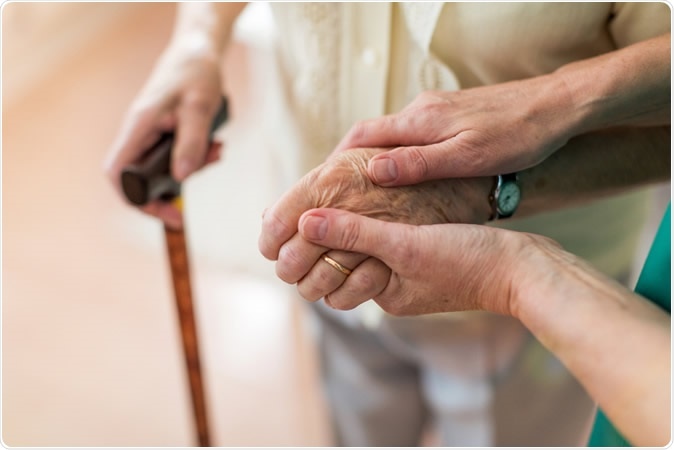Exercise is always difficult to sustain for more than a short period, in most cases. This is all the more true if you’re already sick or in pain, or find movements difficult, as with Parkinson’s disease.
Now, a new solution has been proposed: a motivational app that rewards exercise participants. Not only did the participants keep up with their exercise regimen, but their motor disability was significantly better, comparable to standard drug therapy for this condition.

Image Credit: Pikselstock / Shutterstock
The study
Parkinson’s disease is a chronic illness, with both physical and mental restrictions on activity. To counter this, the Park-in-Shape study put the app to the test, in two groups of participants. All were sedentary, with ages from 30-75 years, and were on stable doses of dopaminergic drugs.
One group did stretching exercises, while the other was asked to exercise on a stationary bicycle, at home. Both were instructed to exercise for 30-45 minutes a day, three times a week for six months.
The motivating app was fitted to the exercise bikes to provide challenge and interest during the exercise routine, converting it into an exercise enhanced by gamified elements, called “exergaming”. It comprises both virtual reality software and real-life videos.
One challenge was trying to better their own previous performance or racing against other cyclists. Each app was designed to adapt the difficulty level to the patient’s heart rate, so as to provide the right level of intensity to the exercise. Thus, with increasing levels of fitness, the challenges increased in difficulty.
The outcome
The participants were tested using the gold standard, the Movement Disorders Society—Unified Parkinson's Disease Rating Scale (MDS-UPDRS) – section dealing with motor assessment – during the off phase of medication, when 12 or more hours had elapsed after the last dose of dopaminergic medication.
The change was obvious: the participants followed the exercise regimen for six months. When re-evaluated at this time, the second group was found to have a significant increase in physical fitness. This has obvious cardiovascular benefits. In addition, these patients reported a better level of control over voluntary movements, scoring about 4.2 points less on the MDS-UPDRS scale compared to the control (stretching) group. This reduction is comparable to that which can be achieved with the use of a lot of the drugs used to treat this condition today.
Of the 65 participants in the exercise and stretching group, ten left in each. Adverse events which could have been related to the exercise occurred in 11% of the cycling and 6% of the control group.
With the outstanding benefits of this intervention, the patient doesn’t have to leave home either, which makes it more likely that this therapy can be extended to many potential beneficiaries. Moreover, it provides fodder for more thought: if six months of exercise does so much good, can we arrest the course of the disease by continuing the exercise much longer? Thirdly, the motivational app, that they call “exergaming”, could help many other patients with medical conditions that make it hard to exercise.
As researcher Nicolien van der Kolk says, “Exercise is a very useful addition to the medication We were pleasantly surprised that people with Parkinson's disease were able to adhere to their exercise regimes so well. The beneficial effect on their motor disability was also large enough to be clinically relevant.”
The study was reported in The Lancet on September 11, 2019.
Journal reference:
Effectiveness of home-based and remotely supervised aerobic exercise in Parkinson's disease: a double-blind, randomised controlled trial. Nicolien M. van der Kolk, Nienke M. de Vries, Roy P. C. Kessels, Hilde Joosten, Aeilko H. Zwinderman, Bart Post, & Bastiaan R. Bloem. https://doi.org/10.1016/S1474-4422(19)30285-6. https://www.thelancet.com/journals/laneur/article/PIIS1474-4422(19)30285-6/fulltext